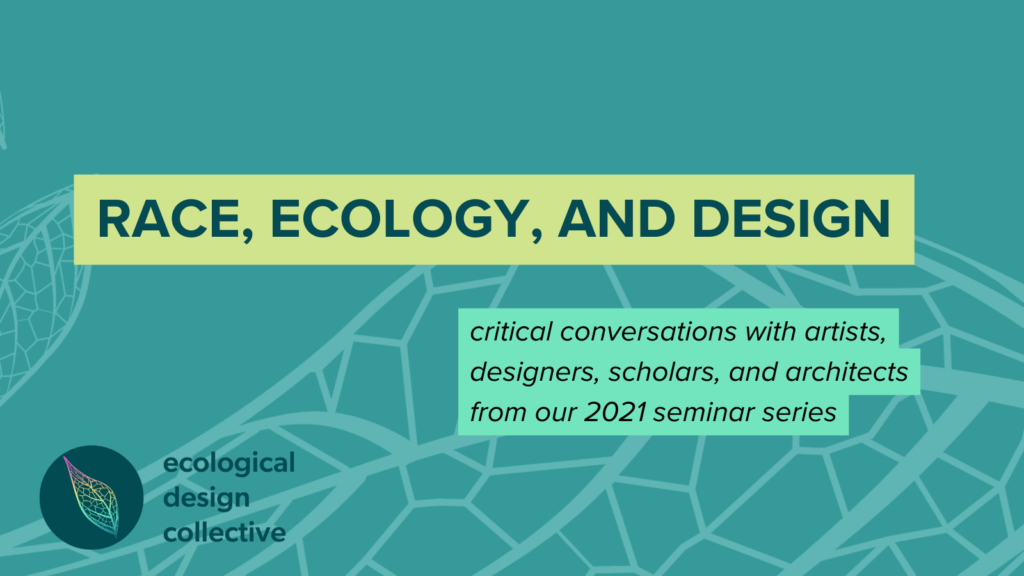
Race, Ecology, and Design: Our 2021 Seminar Series
The Ecological Design Collective revisits a series of conversations with artists, architects, and designers on the confronting the relationship between vernacular knowledges and ecological restoration, racism and environmental degradation, and more.
Our ecological crisis stems from a profound disruption of natural systems around the world, economic structures that celebrate such destruction as progress, and social arrangements that inflict the consequences of this damage on the most marginal and vulnerable of populations.
Design practices are often complicit in these predatory developments, reflecting the exclusionary nature of our capitalist present, and the harsh legacies of racism and colonialism that have long condoned the exploitation of societies and environments “elsewhere.”
What would it mean to imagine instead a design process grounded in attentive listening and responsiveness, in a willingness to engage vernacular knowledge, in the insights that arise from shared struggle, in an abiding commitment to social and environmental justice?
In 2021, the Ecological Design Collective hosted a series of discussions and performances exploring these themes, titled “Race, Ecology, and Design.” The questions and incitements of artists, designers, and discussants remain just as timely and critical as they were then.
Join us in revisiting these archived conversations with artists, designers, scholars, and researchers. Click the links bellow to navigate to each seminar in the series! Or just scroll further below to learn more about each of these conversations.
- Negotiations of Spatial Agency (Quilian Riano, Cleveland Urban Design Collaborative)
- Decolonizing Design: Reflections, Observations, and Challenges (Ahmed Ansari, New York University)
- Accountability > Empathy: Moving from Individual Kindness to Structural Justice in Design (Panthea Lee, Executive Director of Reboot)
- Black Landscapes Matter (Kofi Boone, North Carolina State University)
- Designing Atmospheres for Social Interaction (Belinda Tato, Founder, Ecosistema Urbano)
- Engaging the Black Ethos: Afrofuturism as a Cultural Design Lens for Inclusive Technological Innovations (Woodrow W. Winchester, III, University of Maryland, Baltimore County)
- On Ether: Attuning to Black Struggle in and of the Air (Thandi Loewenson, Royal College of Art)
- Healing, Decolonising, Design: Bringing Honesty, Intimacy, and Healing into a Living Practice of Design (Mukhtara Yusuf, Ilé Laboratory)
- Heterogeneous Futures: Design Thinking Alternatives for Anthropologically and Ecologically Diverse Landscapes (Diana Fernandez Bibeau, Sasaki Design)
- Remaking Everything: Confabulations with the Termites on a Design School (Zoy Anastassakis, Rio de Janeiro State University)
- Indigenous Planning and PlaceKnowing: Employing a Seven Generations Model and Indigenous PlaceKnowing to Inform Community Design and Development (Ted Jojola, University of New Mexico)
Negotiations of Spatial Agency
Quilian Riano, Pratt Institute School of Architecture | Originally published February 4, 2021
Quilian Riano is an architectural and urban designer, researcher, writer, and educator committed to creating designs through democratic processes that support public and civic ideals. At the time of publication, Riano was the Associate Director of the Cleveland Urban Design Collaborative, a non-profit community design center housed in Kent State University’s College of Architecture and Environmental Design. He is currently the Dean of Pratt Institute’s School of Architecture, working across the school’s architecture, landscape, urban design, planning, and management programs and serves as the Vice President for Architecture of the Architectural League of New York.

Stay tuned for a link to the conversation with Quilian Riano here!

Decolonizing Design: Reflections, Observations, and Challenges
Ahmed Ansari, New York University | Originally published on March 4, 2021
Ahmed Ansari is an Industry Assistant Professor in the department of Technology, Culture & Society at NYU. He was a founding member of the Decolonizing Design platform, and the Architecture Design Research Lab in Karachi. For orientations on his seminar, read his co-authored “Decolonizing Design Manifesto” (2019), “On Technodiversity“—an interview with Yuk Hui (2020), and “Ontological Design” by Anne-Marie Willis (2015).

Watch the seminar with Ahmed Ansari, moderated by Anand Pandian, here!

Accountability > Empathy: Moving from Individual Kindness to Structural Justice in Design
Panthea Lee, writer, activist, transdisciplinary designer | Originally published April 1, 2021
Panthea Lee is a transdisciplinary designer and activist and a facilitator working for structural justice and collective liberation. Until 2023, she served as co-founder and Executive Director of Reboot, building transformative coalitions between communities, activists, movements, and institutions to tackle inequity, and collaborating with artists to realize courageous social change. A pioneer in designing and guiding multi-stakeholder processes to address complex social challenges, Panthea advises organizations such as The Laundromat Project, the Royal Society of Arts US, People Powered, and DemocracyNext.
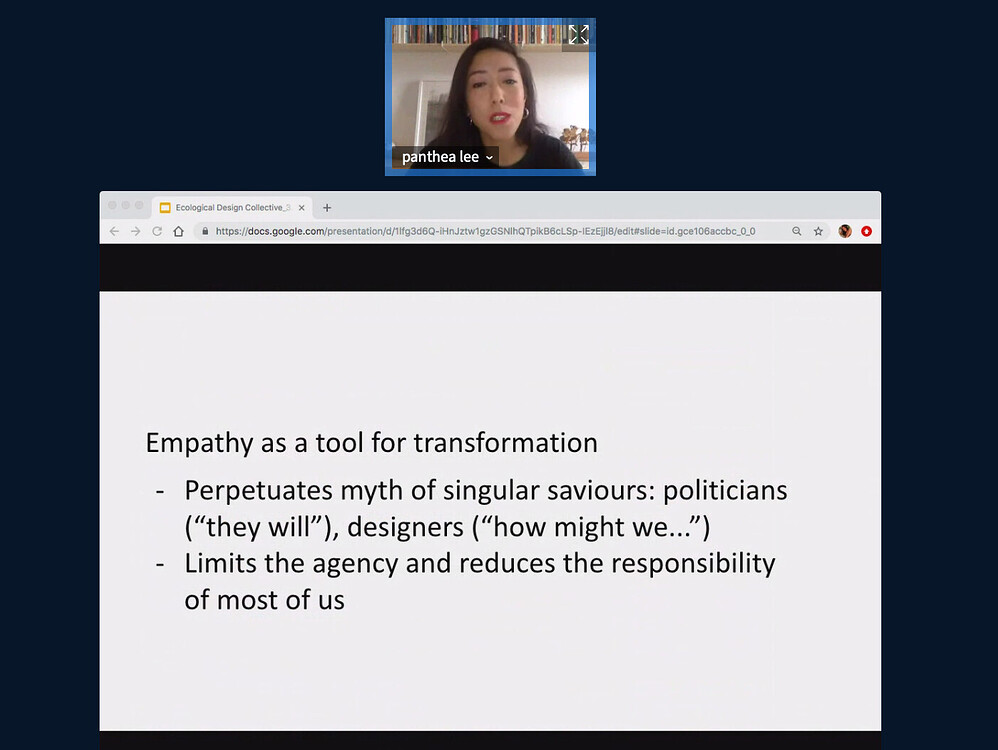
Watch the seminar with Panthea Lee, moderated by Anand Pandian, here!

Black Landscapes Matter
Kofi Boone, North Carolina State University | Originally published May 6, 2021
Kofi Boone is a University Faculty Scholar and Professor in the Department of Landscape Architecture and Environmental Planning, in the College of Design at North Carolina State University. His work concerns the overlap between landscape architecture and environmental justice with specializations in democratic design, digital media, and interpreting cultural landscapes. He serves on the advisory board of the Black Landscape Architects Network, and is President-Elect of the Landscape Architecture Foundation.

[Pull quote/ description of seminar here]
Watch the seminar with Kofi Boone, moderated by Anand Pandian, here!
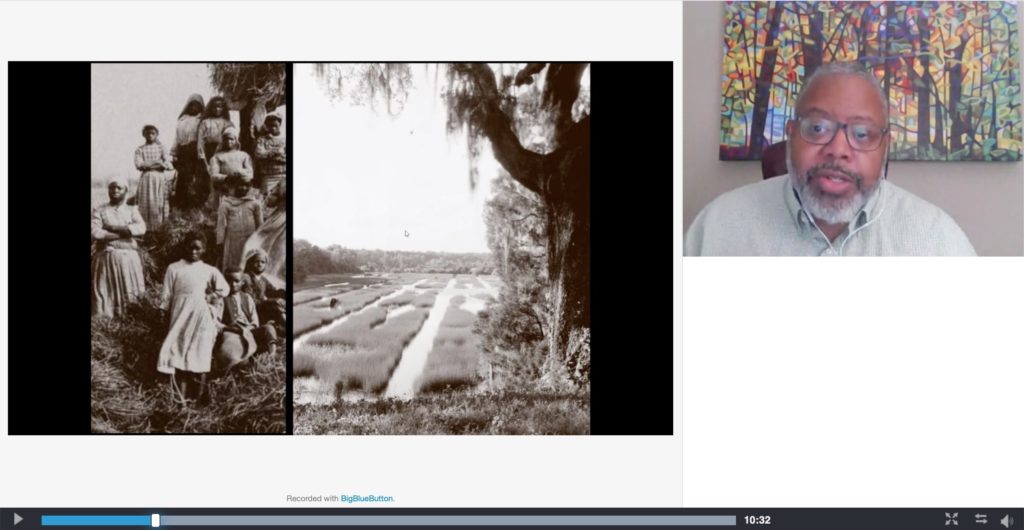
Designing Atmospheres for Social Interaction
Belinda Tato, Ecosistema Urbano | Originally published June 3, 2021
Ecosistema Urbano is a Madrid-based office of architects, designers and professionals specializing in urban innovation projects at the intersection of architecture, landscape design, engineering, and sociology. They seek to design environments, spaces, dynamics and tools in order to improve the self-organization of citizens, social interaction within communities, and their relationship with the environment. In recent years, their research has developed around the design of public spaces focusing especially on the improvement of bioclimatic conditions in contexts and climates as diverse as Norway and Bahrain.

As a part of their methodology, Ecosistema Urbano has been developing diverse participatory techniques to involve citizens in the creative and transformative processes of urban environments, experimenting with social software, communication platforms, and new technologies to achieve the creation of more democratic and equitable urban environments. In this seminar, founder Belinda Tato presents their design principles through a series of projects they have worked on in diverse urban contexts around the world, including the United States, Denmark, Spain, China, Russia, Paraguay, and Ecuador.
Watch the seminar with Belinda Tato, moderated by Mike Degani, here!
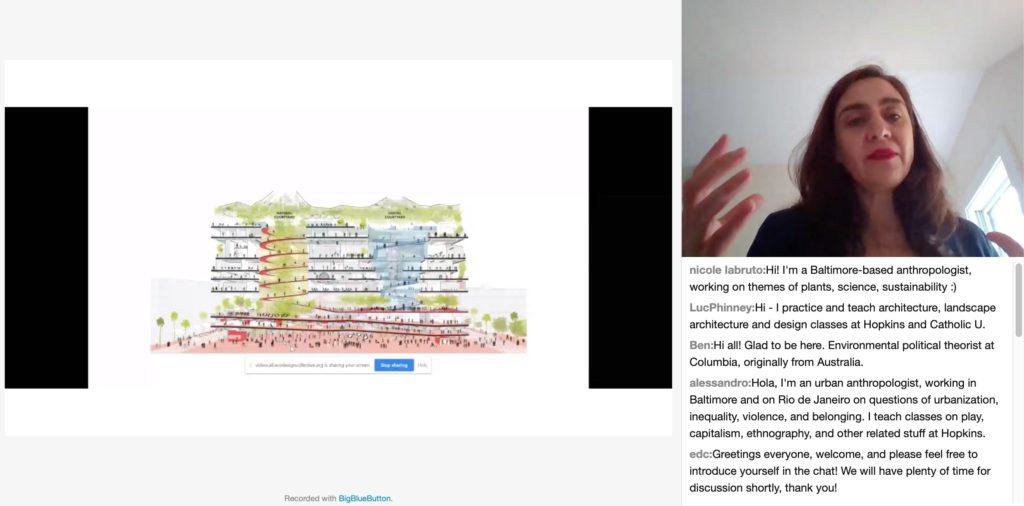
Engaging the Black Ethos: Afrofuturism as a Cultural Design Lens for Inclusive Technological Innovations
Woodrow W. Winchester, III, University of Texas, Austin | Originally published July 1, 2021
An advocate for more equitable, inclusive, and consequential approaches to technology design and deployment, at the time of publication Woodrow W. Winchester, III was Director of Professional Engineering Programs in the College of Engineering and Information Technology at the University of Maryland, Baltimore County. He now serves the executive director of The University of Texas at Austin Texas Engineering Executive Education (TxEEE)

In his essay “Technology & Ethos,” Amiri Baraka (Leroi Jones) states that “Black creation – creation powered by the Black ethos – brings very special results.” This talk explore Baraka’s assertion, proposing Afrofuturism as an emancipatory design lens to make “forms that will express us truthfully and totally.” Engagement with Afrofuturism supports a more inclusive design of future technologies, more relevant and responsive to Black mind, body, and spirit.
Watch the seminar with Woodrow W. Winchester, III, moderated by Nicole Labruto, here!
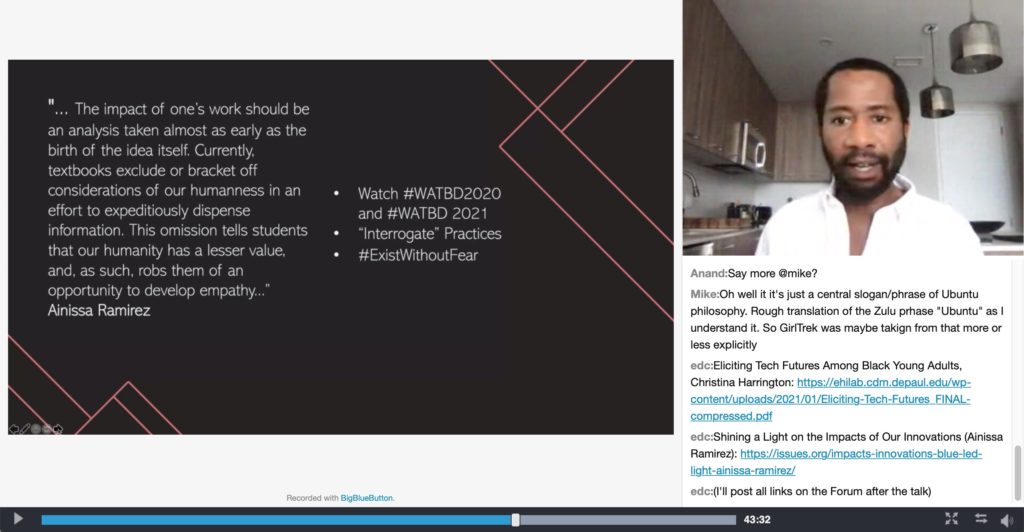
On Ether: Attuning to Black Struggle in and of the Air
Thandi Loewenson, Royal College of Art | Originally published August 5, 2021
Architectural designer and researcher Thandi Loewenson works with design, fiction, and performance to interrogate our perceived and lived realms, and to speculate on the possible worlds in our midst. A tutor at the Royal College of Art in London, she engages in projects that mobilize the “weird” and “tender,” and motivate communities, policymakers, artists and architects to act on these provocations. Loewenson is a co-curator of Race, Space, and Architecture, and a co-foundress of the architectural research collectives BREAK//LINE and Fiction, Feeling, Frame.
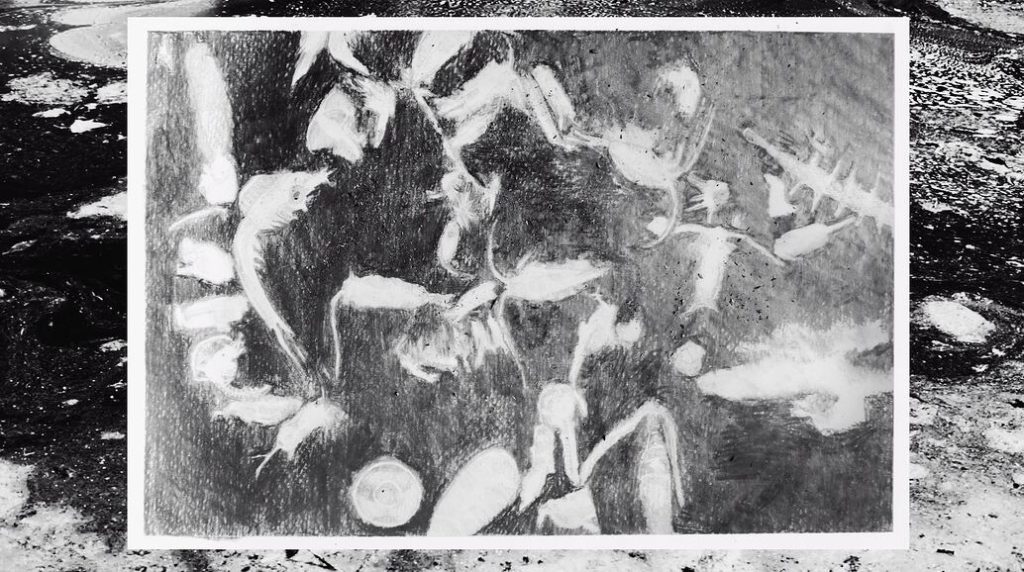
“We encounter the atmospheric conditions of liberation, conjured through smoke, thickening of air and airwaves, and aided by unfamiliar voices and mystical birds.” Unfolding through drawings, footage of ash and smoke, cinematic critiques of racial capitalism, and the errantly asthmatic lungs of a “born-free daughter of the soil,” Lowenson’s performance based film-in-progress contended with the role of the air in the imaginary of black liberation.
View the discussion with the artist Thandi Loewenson and discussants Anand Pandian (Johns Hopkins, Anthropology), Jane Bennett (Johns Hopkins, Political Science and Comparative Thought and Literature), and Andrew Johnson (Stockholm University, Social Anthropology) here!

Healing, Decolonising, Design: Bringing Honesty, Intimacy, and Healing into a Living Practice of Design
Mukhtara Yusuf, Ilé Laboratory | Originally published October 7, 2021
Mukhtara Yusuf (they/them) is an indigenous Yoruba from what is now southwestern Nigeria. Mukhtara’s practice explores indigenous healing at multiple scales. They hold a BA from Dartmouth College, an MA in Communications and Media from UCSD and an MFA in Design from UT Austin. They are the founder of Ilé Laboratory, an Ibadan-based agro-centric ecological design laboratory focused on Yoruba material knowledge and healing. Mukhtara is currently a Rose Enterprise Affordable Housing Artist Fellow, a lab member of CLEAR (Civic Laboratory for Environmental Action Research), and a Coding Resistance Fellow with Futuress.org.

“An ecosystemic approach presents the opportunity for designers to consider more deeply their entanglements with racism in design,” Mukhtara Yusuf writes. “We are ecosystems that are part of still larger ecosystems. Understanding ourselves in this way makes it possible to consider our roles in the personal and political aspects of racism simultaneously.”
View the artist’s presentation with Mukhtara Yusuf, founder of the Ilé Laboratory based in Ibadan, Nigeria, and discussant Anand Pandian on bringing honesty, intimacy, and healing into a living practice of design, here!

Heterogeneous Futures: Design Thinking Alternatives for Anthropologically and Ecologically Diverse Landscapes
Diana Fernandez Bibeau, Boston Planning & Development Agency | Originally published September 2, 2021
Building upon principles rooted in landscape ecology, landscape heterogeneity presents an opportunity to embrace the concept of difference to build resilient and community focused landscapes. This dialogue exposes the interconnected relationship between ecology and the anthropological sciences. From the design of a public landscape to commemorate Black culture, to increasing ecological complexity in urban and suburban systems through planting, landscape heterogeneity creates a platform for change within the doctrine and practice of designing landscapes.
At the time of this conversation, Diana Fernandez Bibeau was a Senior Associate with the international environmental design firm Sasaki Design; she now serves as Deputy Chief of Urban Design at the Boston Planning & Development Agency. A proven thinker, collaborator and leader, she works with architects, planners, urban designers, ecologists and civil engineers on the design of equitable and sustainable places. In 2020, she was awarded the Emerging Professionals Medal by the American Society of Landscape Architects.

“From the mountains of the Dominican Republic to the streets of NYC,” landscape architect Diana Fernandez Bibeau writes, “I root myself as a designer in my lived experiences of space and place.” We spoke with Diana on “making space for inclusive futures that embrace and celebrate our differences in the physical manifestation of place.”
Watch the presentation and discussion with Diana Fernandez Bibeau, moderated by anthropologist Mike Degani, here!

Remaking Everything: Confabulations with the Termites on a Design School
Zoy Anastassakis, Rio de Janeiro State University (ESDI/UERJ) | December 2, 2021

Evoking the termites that occupied the campus where she teaches in Rio de Janeiro, Zoy Anastassakis suggests that the crisis affecting universities can be re-envisioned as an opportunity for resurgence and the collective production of spaces for living together in difference.
From 2016-2017, students, alumni, professors, and employees at the Rio de Janeiro State University’s School of Industrial Design (Escola Superior de Desenho Industrial [ESDI]) started a movement called “ESDI Aberta” (“ESDI Open”), investing in alternative ways to live in difference, in response to the administrative and financial crisis that affected not only the design school and the whole university, but all institutions of public education in Brazil.
Zoy Anastassakis, PhD, Brazilian Designer and Anthropologist, reflects in this discussion on unique struggles and opportunities navigated within this movement. Between 2016 and 2018, she was Director of the School of Industrial Design (ESDI) at the Rio de Janeiro State Univerity (Escola Superior de Desenho Industrial, Universidade do Estado do Rio de Janeiro [UERJ]), where she works as an Associate Professor. At ESDI, she coordinates the Design and Anthropology Laboratory (Laboratório de Design e Antropologia). Together with Marcos Martins, she is co-author of a book on ESDI’s experimentations, Everyday Acts of Design: Learning in a Time of Emergency, published in Bloomsbury’s series “Design in Dark Times.”
Revisit this engaging discussion with Zoy Anastassakis, moderated by Nicole Labruto, Assistant Research and Director of the Program in Medicine, Science, and the Humanities at Johns Hopkins University, here!

Indigenous Planning and PlaceKnowing: Employing a Seven Generations Model and Indigenous PlaceKnowing to Inform Community Design and Development
Ted Jojola, University of New Mexico | Originally published November 4, 2021

Indigenous Planning employs a Seven Generations model that uses culture and identity to inform community development. PlaceKnowing is necessary for understanding how communities construct their worldview to give and sustain meaning to the landscapes they inherit.
Theodore (Ted) Jojola, PhD is a Distinguished Professor in the Community & Regional Planning Program, School of Architecture + Planning, University of New Mexico (UNM), and Founder and Director of the Indigenous Design + Planning Institute (iD+Pi). Professor Jojola is actively involved in major research projects on Indigenous community development and PlaceKnowing. He is co-editor of two books: How It Is: The Native American Philosophy of V.F. Cordova (U. of Arizona Press, 2007) and Reclaiming Indigenous Planning (McGill-Queens University Press, 2013). He has published numerous articles on topics relating to indigenous design & planning, stereotyping and economic development.
Professor Jojola was Director of Native American Studies at UNM from 1980-1996, and established the interdisciplinary undergraduate degree program in Native Studies. He is an enrolled member of the Pueblo of Isleta. The Indigenous Design + Planning Institute (iD+Pi) works with tribal communities throughout the Southwest region as well as internationally by facilitating culturally informed approaches to community development.
View the discussion with Ted Jojola, moderated by Lee Davis, Co-Director, Center for Social Design, Maryland Institute College of Art (MICA), here!

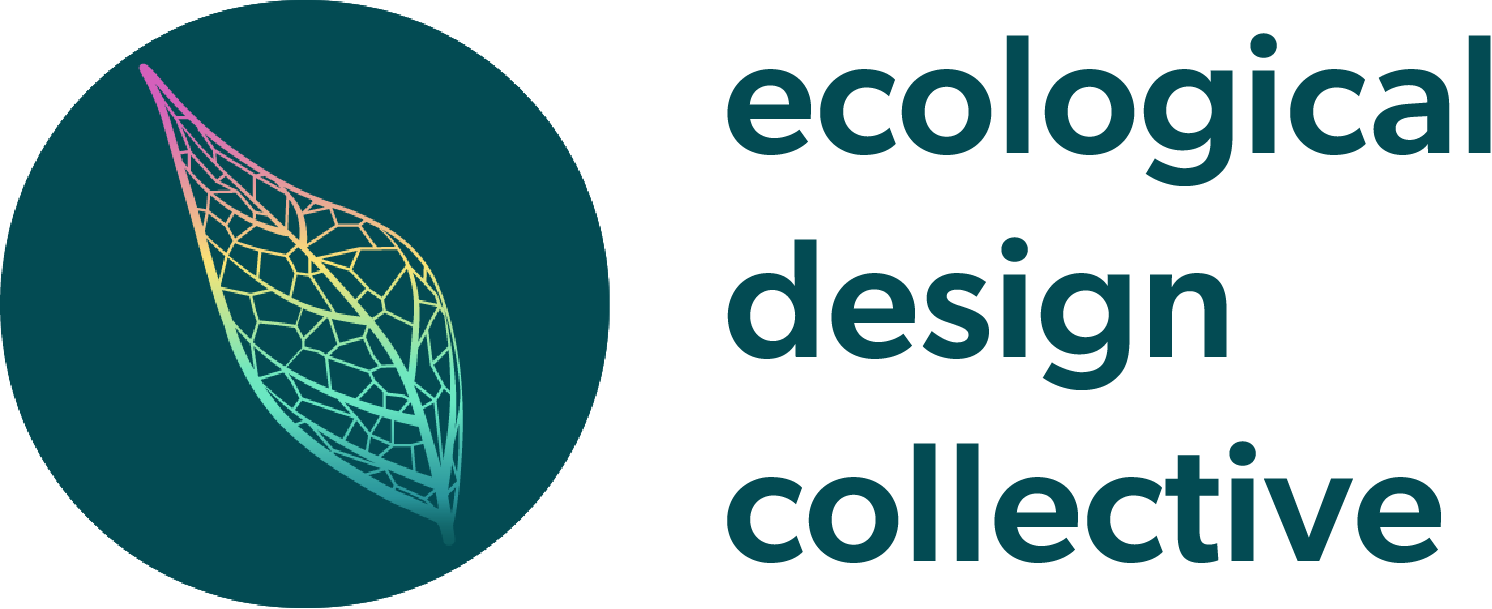

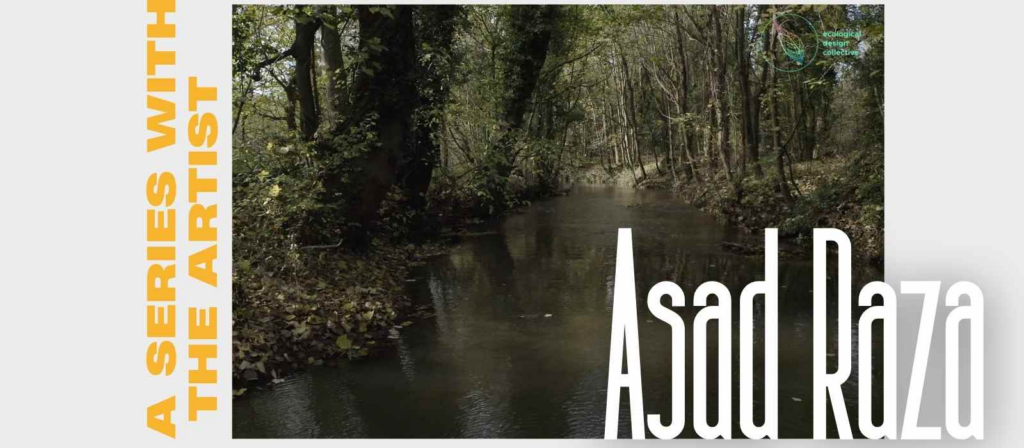


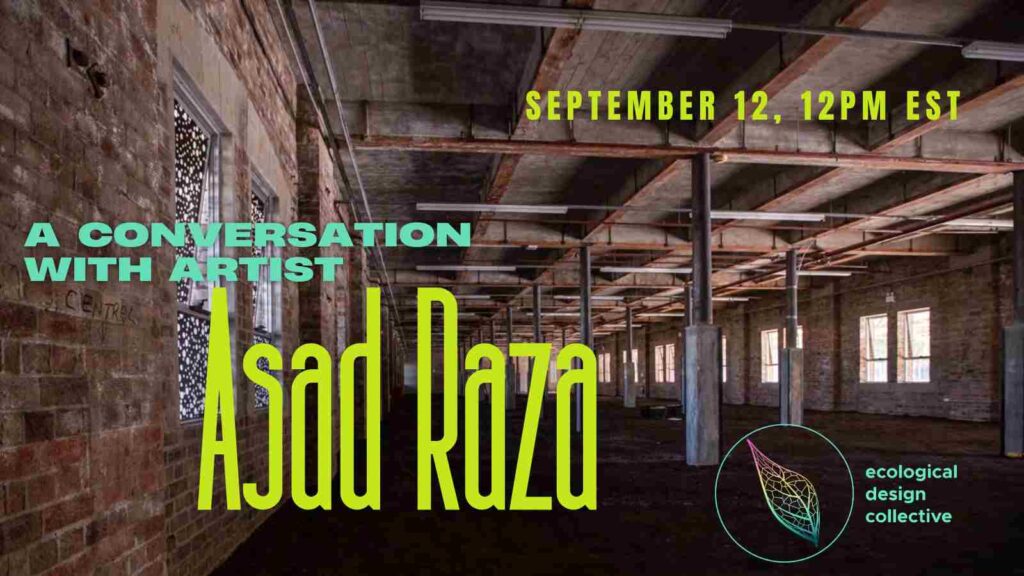
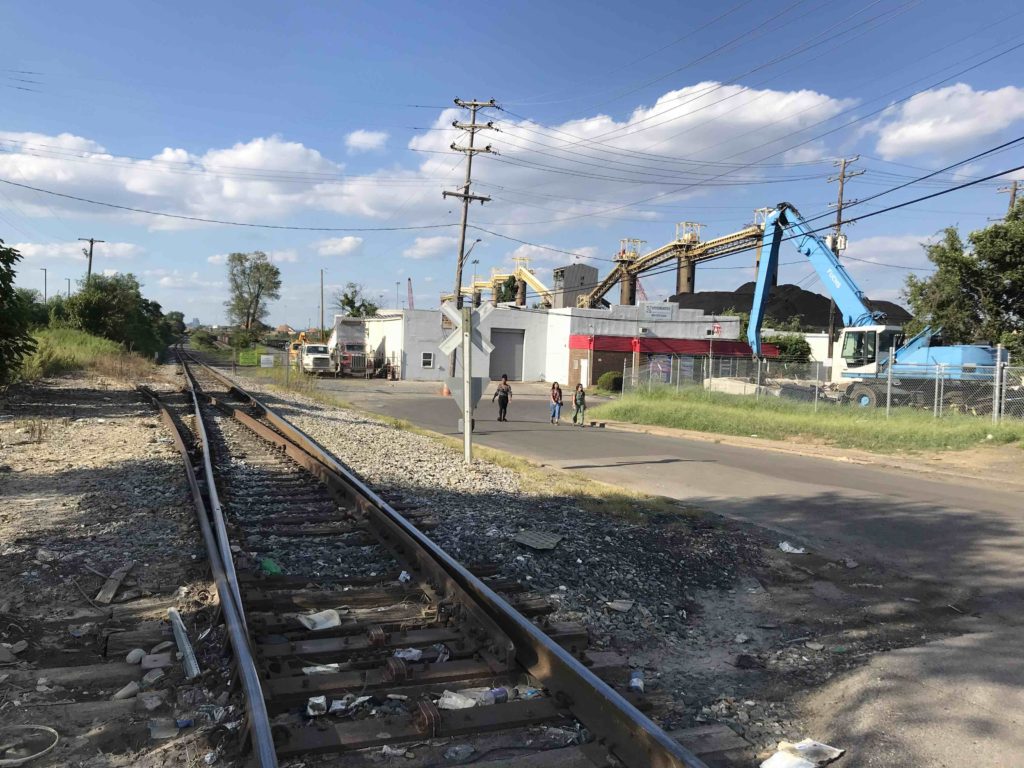
Responses